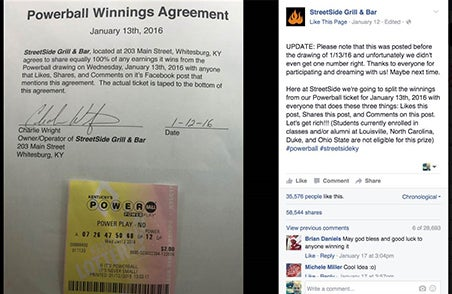About a month ago, our nation was in the grips of billion-dollar Powerball madness. Amid all the people posting pictures of their tickets and saying what they would do if they won, a few businesses jumped in trying to create a viral moment for themselves.
A few months ago, our nation was in the grips of billion-dollar Powerball madness. Amid all the people posting pictures of their tickets and saying what they would do if they won, a few businesses jumped in trying to create a viral moment for themselves.
On the surface, this Facebook post looks like a marketing win for the StreetSide Grill and Bar of Whitesburg, Ky. While I know absolutely nothing about the establishment, the town, or the owner, I can surmise the conversation and logic around it: The owners thought the chances of winning were (as they are every drawing) one in 292 million, so with all the hype around the $1.5 billion drawing, spending $2 to see if something could go viral would be awesome. The place offered to share its Powerball winnings with anyone who liked, shared, or commented on a Facebook post that included a copy of the restaurant’s ticket.
Wikipedia tells me Whitesburg is a town of a little more than 2,100 people. It also lists as a cultural attraction Appalshop, a multi-disciplinary arts and education center founded in 1969 that produces original films, video, theater, music, and spoken-word recordings, radio, photography, multimedia, and books.
Arguably then, the StreetSide Grill and Bar getting 35,000 likes, 58,000 shares, and 28,000 comments off the post is likely the most viral moment a business in Whitesburg has had. The place now also has more than 11,000 people who like it on Facebook.
In the end, was this “good marketing?” Some would argue yes; for the cost of a $2 ticket, typical metrics indicate this generated in the area of eight to nine million impressions via the 58,000 shares. Ask digital ad buyers if they can get that deal every day, and they’d take it. And because these shares were reasonably authentic—the people sharing it trusted the offer as real and were telling their friends to get in on the opportunity—they likely got much higher-than-average engagement. From a pure metric standpoint, this looks like a reporting gold mine, something any marketer would use by taking a chart of the results into a boss to demand a raise.
Let’s think about it from the perspective of two big areas of social media marketing: low organic reach and metrics versus business impact.
Organic reach: My guess is the StreetSide Facebook community jumped 10 times from the impact of this post. While this sounds awesome, 90% of the audience quit caring the moment the Powerball drawing happened. With this increase of unengaged followers, the organic reach to its core audience will drop even further as the bigger the community, the lower the percentage of reach—and lower engagement will drive that even further into oblivion.
Vanity metrics vs. business impact: Assuming this post generated between eight and nine million impressions to go with the tens of thousands of shares, likes, and comments from a metric standpoint, it’s a knock-it-out-of-the-county home run. But if you consider this from a business perspective—and the goal of marketing is to increase business—how many new people came in and sat down for dinner or how many current customers came in more frequently or spent more each visit? I could be wrong, but unless those eight to nine million impressions had people lining out the door or ordering T-shirts online, the real business impact was negligible.
So was it a win? The place got a lot of awareness in the days leading up to the drawing. But it makes future efforts harder and less successful, and in all likelihood, it didn’t help the business. In the long term, the needle probably tilts down.
To succeed in social marketing today, building an audience or vanity metrics don’t translate to helping your business. If you can create shareable content or create a customer experience that gets people to authentically talk about your business, gets new people to engage with your business, become a customer, or be a more loyal customer, then you’re winning.
And just think what would have happened if the place won …
